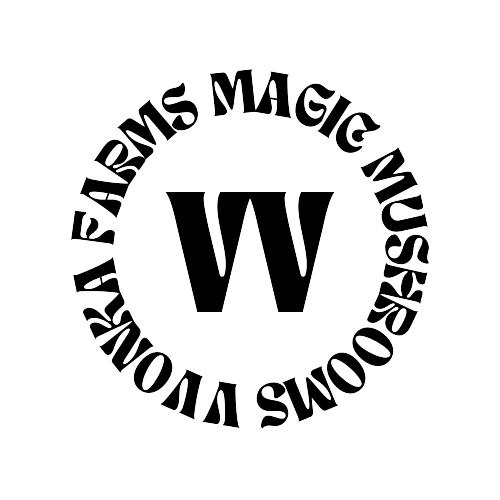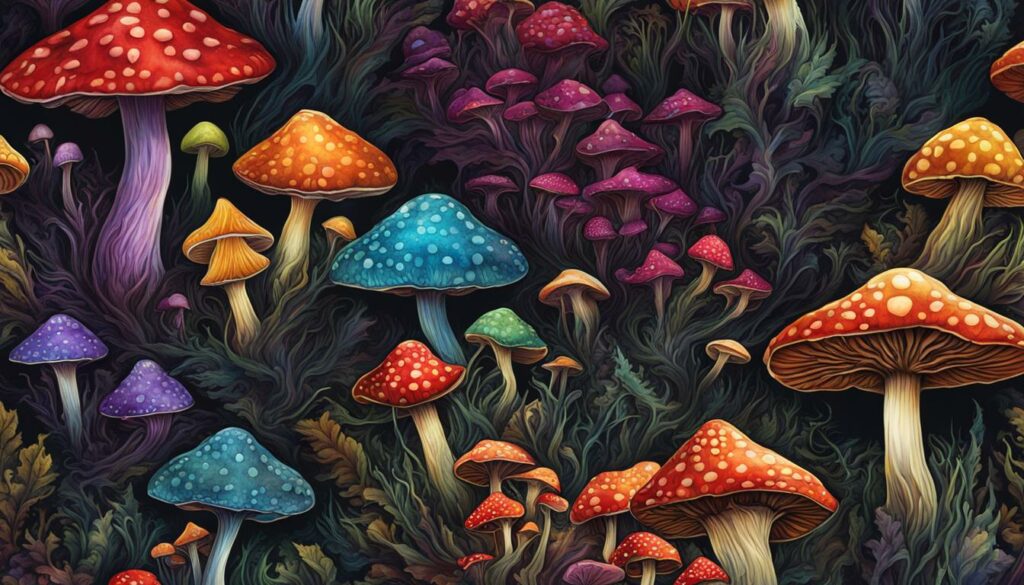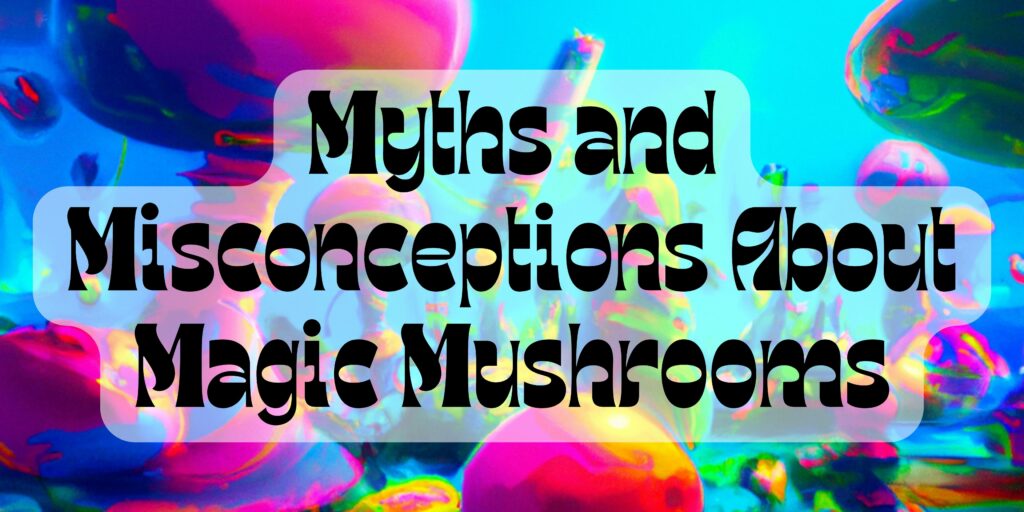Welcome to our informative article on bad shrooms, where we delve into the harmful effects and risks associated with these psychedelic mushrooms. Whether you’re curious about their potential dangers or looking for comprehensive information, we’ve got you covered.
Key Takeaways:
- Bad shrooms, also known as magic mushrooms, contain the psychoactive compound psilocybin.
- Side effects of shrooms can include nausea, drowsiness, paranoia, and hallucinations.
- Consuming poisonous mushrooms that resemble magic mushrooms can lead to severe illness or even death.
- Understanding the potential mental effects and risks of psychedelic mushrooms is crucial.
- Psilocybin, the active compound in magic mushrooms, is currently being researched for its therapeutic potential.
Understanding the Effects of Psychedelic Mushrooms
Magic mushrooms, also known as psychedelic mushrooms, are a type of fungi that contain the psychoactive compound psilocybin. When ingested, psilocybin is converted to psilocin in the body, which interacts with serotonin receptors in the brain, resulting in altered perception and hallucinations.
The effects of psychedelic mushrooms can vary widely from person to person and are influenced by several factors including dosage, set and setting, and individual characteristics. Some individuals may experience a sense of euphoria and heightened sensory perception, while others may have anxiety, confusion, or even frightening hallucinations. This unpredictability can lead to what is commonly referred to as a “bad trip.”
It is important to note that the adverse effects of magic mushrooms can be temporary and wear off once the drug has left the system. However, individuals with a history of mental health issues, such as anxiety or psychosis, may be more susceptible to negative experiences and should exercise caution when considering the use of psychedelic mushrooms.
Table: Comparing Effects of Psychedelic Mushrooms
| Positive Effects | Negative Effects |
|---|---|
| Euphoria and heightened sensory perception | Anxiety and paranoia |
| Enhanced creativity and introspection | Confusion and disorientation |
| Spiritual experiences and feelings of interconnectedness | Frightening hallucinations and psychosis |
While psychedelic mushrooms can have profound effects on perception and consciousness, it is crucial to approach their use with caution and respect. It is recommended to have a trusted and sober individual present during the experience and to be aware of the legal implications and risks associated with the use of magic mushrooms.
The Therapeutic Potential of Psilocybin
Researchers have been exploring the therapeutic potential of psilocybin, the active compound in magic mushrooms. Studies have found that psilocybin can be an effective treatment for depression, nicotine and alcohol addictions, and other substance use disorders. It has also been shown to provide relief from the emotional distress of individuals with life-threatening cancer diagnoses. However, it is crucial to note that these studies are currently conducted in controlled research and medical settings under the supervision of trained professionals. Psilocybin is classified as a Schedule I drug and cannot be prescribed for medicinal use unless its classification is changed.
Psilocybin-assisted therapy has shown promising results in improving mental health outcomes. This form of therapy involves a guided experience with a trained therapist, where psilocybin is administered in a controlled and supportive environment. The psychedelic experience induced by psilocybin is believed to help individuals gain new perspectives, access repressed emotions, and foster personal growth.
It is important to understand that psilocybin-assisted therapy is not a standalone treatment but is integrated into a comprehensive therapeutic approach. The therapy sessions are typically accompanied by preparatory and integration sessions to maximize the therapeutic benefits and support long-term positive changes. The use of psilocybin in therapeutic settings is still in its early stages, and more research is needed to fully understand its efficacy and safety.
| Condition | Therapeutic Benefit |
|---|---|
| Depression | Reduces symptoms, increases mood, promotes emotional well-being |
| Addiction | Helps break addictive patterns, reduces cravings, enhances self-awareness and motivation for recovery |
| Cancer-related distress | Alleviates anxiety, fear of death, and existential distress, enhances psychological and spiritual well-being |
While the therapeutic potential of psilocybin is promising, it is important to approach its use with caution. The effects of psilocybin can be intense and unpredictable, and not everyone may benefit from or have a positive experience with this form of therapy. It is crucial to work with trained professionals who can provide guidance and support throughout the process. Additionally, the legal status of psilocybin varies, and it is important to be aware of the laws and regulations in your jurisdiction before considering its use.

Risks and Considerations
While psilocybin-assisted therapy shows promise, there are considerations and potential risks to keep in mind. Some individuals may experience challenging or difficult emotional experiences during therapy, commonly referred to as a “bad trip.” It is important to have proper support and a safe environment to navigate these experiences. Psilocybin can also interact with certain medications or exacerbate underlying psychiatric conditions, so it is crucial to undergo a thorough screening process prior to engaging in psilocybin-assisted therapy.
- Psilocybin-assisted therapy should only be conducted under the supervision of trained professionals in a controlled therapeutic setting.
- It is crucial to have comprehensive pre-screening to ensure the therapy is suitable and safe for each individual.
- The therapy sessions should be supported by integration sessions to help process and integrate the experiences and insights gained during the psychedelic experience.
- Psilocybin-assisted therapy is not recommended for individuals with a history of psychosis or severe mental health disorders.
Potential Risks and Precautions
When consuming shrooms, there are several potential risks and precautions to consider. It is important to be aware of these risks and take necessary measures to ensure your safety.
Potential Health Risks
Consuming shrooms can have physical effects on the body. These can include dilated pupils, increased heart rate, and nausea. It is important to be mindful of these physical reactions and monitor your body’s response when taking shrooms.
Mental Health Risks
One of the potential risks of taking shrooms is the possibility of having a “bad trip.” This refers to a negative or frightening psychedelic experience that can cause extreme anxiety, paranoia, and confusion. It is important to be in a safe and comfortable environment when taking shrooms and to have a trusted individual present who can help guide and support you through the experience.
It is also worth noting that consuming shrooms can potentially worsen existing mental health conditions or trigger underlying psychological issues. If you have a history of mental health conditions, it is advisable to speak with a healthcare professional before considering the use of shrooms.
Dangers of Mixing Drugs
Mixing drugs, including alcohol, with shrooms can be extremely dangerous and increase the risks associated with their consumption. The combination of different substances can have unpredictable effects on both the body and mind, and can potentially lead to adverse reactions or even overdose.
It is crucial to exercise caution and avoid mixing drugs with shrooms to ensure your safety and well-being.
| Risks | Precautions |
|---|---|
| Potential physical effects such as dilated pupils, increased heart rate, and nausea | Monitor your body’s response, stay hydrated, and be mindful of your physical well-being |
| Potential for a “bad trip” and negative psychological experiences | Choose a safe and comfortable environment, have a trusted individual present, and practice relaxation techniques |
| Possible exacerbation of existing mental health conditions | Seek guidance from a healthcare professional before use if you have a history of mental health conditions |
| Dangers of mixing drugs, including alcohol, with shrooms | Avoid mixing substances to prevent unpredictable effects and potential overdose |
Legal Considerations and Decriminalization
When it comes to the legality of shrooms, the situation can vary depending on your jurisdiction. In many places, including the United States, psilocybin is classified as a Schedule I drug, making it illegal to possess, sell, or distribute. However, there has been a recent push towards decriminalization and reevaluating the legal status of mushrooms.
Some cities, such as Denver and Oakland, have taken steps to decriminalize mushrooms, recognizing the potential benefits and therapeutic uses of psilocybin. In fact, the state of Oregon has enacted a legal framework that allows for the regulated use of therapeutic psilocybin. This shift in attitude reflects a growing understanding of the potential benefits and positive impact of psychedelics.
It’s important to note that while some jurisdictions have relaxed the laws surrounding mushrooms, caution is still advised. The legal landscape can be complex and subject to change. Understanding the specific laws and regulations in your jurisdiction is crucial to ensure compliance and avoid any legal consequences.
| Region | Legal Status of Shrooms |
|---|---|
| United States | Illegal (with some exceptions in certain cities and states) |
| Canada | Illegal (with ongoing discussions surrounding decriminalization) |
| Netherlands | Psilocybin truffles are legal and can be purchased in smart shops |
| Brazil | Legal for religious and ceremonial use by some indigenous communities |
| Australia | Illegal (with some exceptions for medical research) |
Note: The table above provides a general overview and may not reflect the current legal status in every jurisdiction. Always consult local laws and regulations.
Community and Clinical Research
Research on psychedelics and the therapeutic potential of shrooms is a rapidly growing field. Scientists and medical professionals are conducting studies to explore the effects of psilocybin and other psychedelics on various mental health conditions and addictions. The aim is to better understand how these substances can be used in clinical settings to improve patient outcomes and overall well-being.
A significant area of research focuses on psychedelic-assisted therapy, where psilocybin is administered in a controlled environment under the guidance of trained professionals. These therapy sessions often involve a combination of talk therapy and the use of psychedelics to enhance the therapeutic process. Initial findings from these studies have shown promising results, with participants reporting significant reductions in symptoms of depression, anxiety, and addiction.
Studies on shrooms have also explored their potential in treating post-traumatic stress disorder (PTSD). Research has shown that psilocybin-assisted therapy can help individuals with PTSD process traumatic memories and reduce the associated distress. These findings have paved the way for further investigation into the use of psychedelics for trauma-related conditions and other mental health disorders.
The Role of Clinical Trials
Clinical trials play a vital role in advancing our understanding of psychedelics and their potential therapeutic benefits. These trials adhere to rigorous protocols and ethical guidelines to ensure participant safety and the validity of the research findings. They involve screening participants for suitability, providing thorough medical and psychiatric evaluations, and closely monitoring individuals during psychedelic experiences.
By conducting well-designed clinical trials, researchers can gather scientific evidence to support the use of psychedelics in clinical practice. These studies contribute to the growing body of knowledge around psychedelic therapy and help shape future treatment approaches for mental health conditions.
Conclusion
Taking shrooms can pose significant risks and dangers to your physical and mental well-being. It is important to understand the potential harm associated with consuming poisonous mushrooms that may resemble magic mushrooms. Additionally, the effects of psychedelic experiences can be unpredictable, leading to potential physical discomfort and mental distress.
While some research suggests that psilocybin, the active compound in shrooms, may have therapeutic benefits, it is crucial to note that these substances should only be used under controlled conditions and with medical guidance. The risks of taking psychedelics, including the possibility of having a bad trip, experiencing flashbacks, and exacerbating existing mental health conditions, should be carefully considered.
Being informed about the legal implications and restrictions regarding shrooms in your jurisdiction is also crucial. In many places, including the United States, psilocybin is classified as a Schedule I drug and is illegal to possess, sell, or distribute. However, there is an ongoing movement to decriminalize and change the legal status of mushrooms in certain areas.
Ultimately, making informed decisions about the use of shrooms requires a thorough understanding of the potential risks and dangers involved. It is essential to prioritize your safety and well-being by seeking professional guidance and support when considering the use of psychedelics.
FAQ
What are the potential risks of consuming shrooms?
The potential risks of consuming shrooms include physical effects such as dilated pupils, increased heart rate, and nausea. Mental health risks include the possibility of having a bad trip, experiencing flashbacks, and exacerbating existing mental health conditions. There is also a risk of consuming poisonous mushrooms that resemble magic mushrooms, which can cause severe illness, organ damage, and even death.
What are the potential therapeutic uses of psilocybin?
Psilocybin, the active compound in magic mushrooms, has shown potential as a treatment for depression, nicotine and alcohol addictions, and other substance use disorders. It has also been used to provide relief from the emotional distress of individuals with life-threatening cancer diagnoses. However, these studies are currently conducted in controlled research and medical settings under the supervision of trained professionals.
What are the legal considerations regarding shrooms?
Depending on the jurisdiction, the possession, sale, or distribution of psilocybin mushrooms may be illegal. In some places, there have been efforts to decriminalize or change the legal status of mushrooms. It is important to be aware of the legal implications and restrictions regarding shroom possession and use in your specific jurisdiction.
What ongoing research is being conducted on psychedelics?
Researchers are exploring the potential therapeutic uses of psychedelics, including shrooms, for various conditions such as depression, anxiety, addiction, and PTSD. Clinical trials are being conducted to ensure the safety and well-being of participants, with medical monitoring, psychiatric screening, and necessary social support in place.
What are the potential dangers of taking shrooms?
Taking shrooms carries potential risks and dangers, including physical and mental health effects. These can include nausea, drowsiness, nervousness, paranoia, hallucinations, and psychosis. Additionally, there is a risk of consuming poisonous mushrooms that resemble magic mushrooms. It is important to be aware of the potential harm and unpredictable nature of psychedelic experiences.




